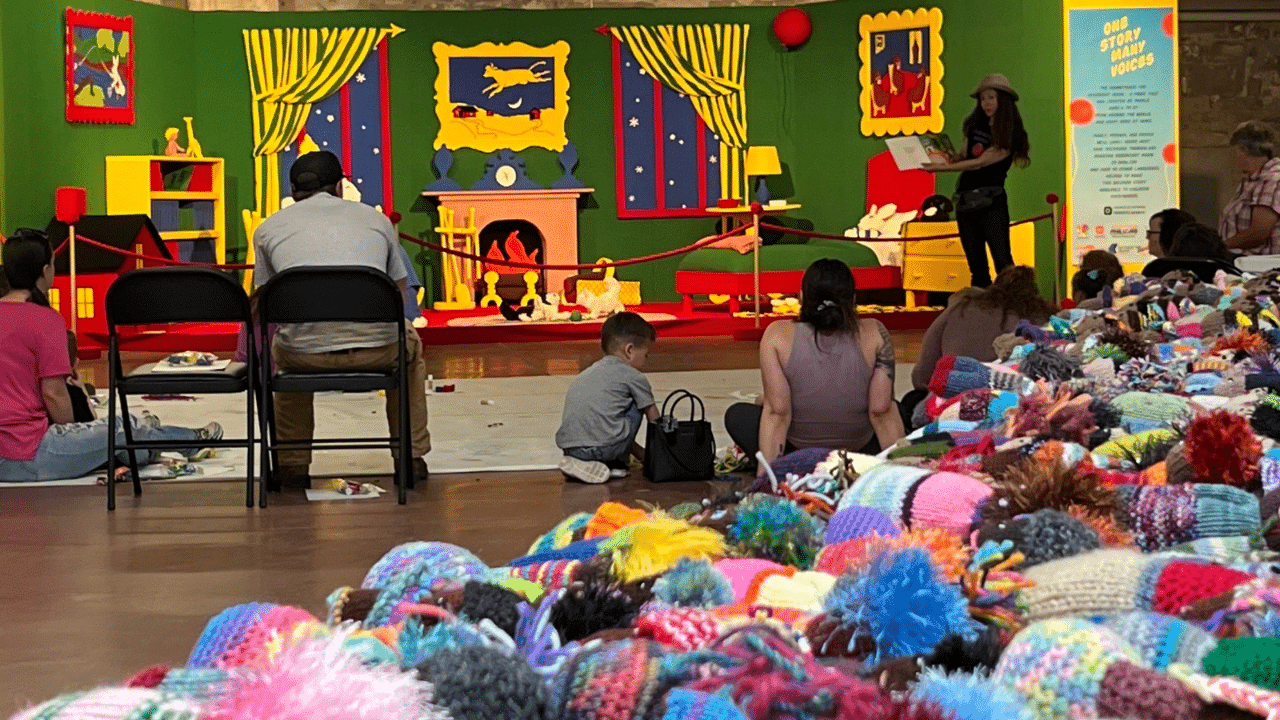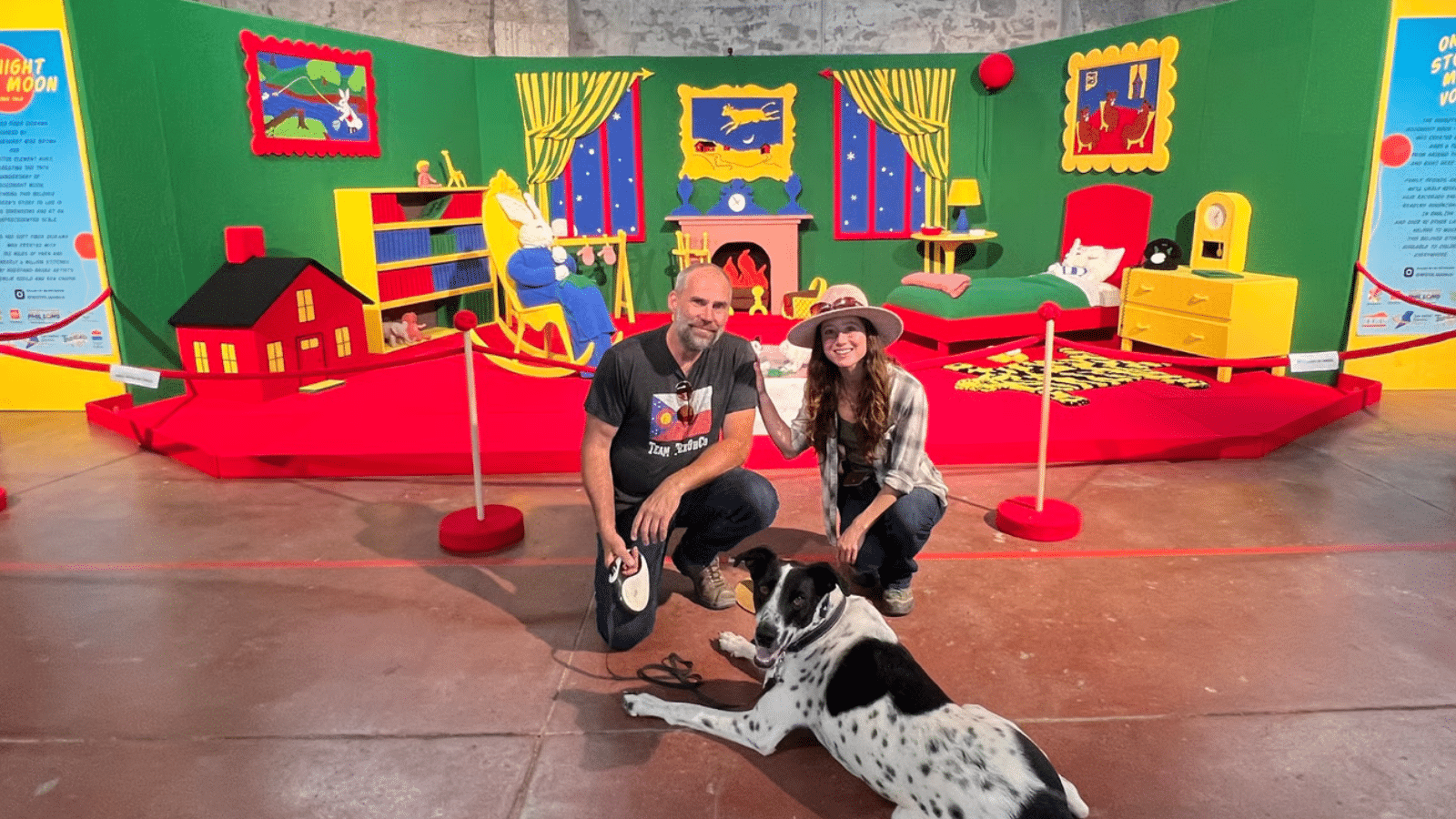By Brook Sutton and Margaret Hedderman
Emilie Odeile and Ken Chapin are not afraid to take risks.
“Being reasonable has never really been one of our operating constraints,” Ken says. In pursuit of pure artistry, that philosophy may fuel some of the magic Emilie creates as a contemporary fiber artist. But make no mistake. Emilie and Ken are also building a business through art.
Emilie and Ken are the co-founders of Dundee & Lee, which is the official name of their creative partnership, based in Trinidad, Colorado. They each bring artistic talent and sensibilities to their large-scale fiber sculptures. Hers is by way of knitting the textiles into fantastical visions. While his background in the arts is a definite plus, his responsibility is to navigate the business and entrepreneurial side of making art.
In June, we were thrilled to announce Emilie as Startup Colorado’s inaugural artist-in-residence. This is a story of how two people met through Etsy, then built a partnership of love, art, and business.
A “Yes, And” Approach to Life
Emilie’s fiber art success was not a part of a masterplan. In the early 2000s, she was trying to make it as an actress in Los Angeles. To kill time while on set, she taught herself how to knit. Pretty soon, people on set were asking if she could knit specific items for them. From her performing background, she was taught to say yes to absolutely every question. Despite not knowing how to knit what had been requested, Emilie’s training kicked in and she said, “Yes!” And, she did.
Before long, Emilie had set up her own knitting shop and was a sought after designer/maker for commercials, movies, and more.
Meanwhile, in Ohio, Ken was embarking on a new business himself. Ken had been producing shows and art-focused events around Cleveland, with the underground edge of performance and installation artists. His success in the local art scene led some artists to question how they could use their art to escape poverty. When Ken’s immediate counsel was to launch their own business, he realized his credibility relied on him doing the same. With woodworking skill but zero knitting knowledge, he set up a shop on Etsy selling giant knitting needles.

As fate would have it, those beautiful, giant needles would connect him with Emilie.
Co-marketing and a Whirlwind Romance Leads to Colorado
Ken’s business was picking up, with one small challenge: he was getting questions about knitting that he could not answer. He casually reached out to one of his customers, Emilie, to run the questions by her.
The “casual” part didn’t last long. After about three phone calls, the tone evolved to be a bit more flirtatious and the two decided to meet in person. By their third date, Emilie was driving to Colorado (where Ken now lived) with most of her belongings stuffed in her car.
After a few more cross-country transports and an RV trip purely for adventure, the two eventually found their own land in Southern Colorado. They continued to run and co-market their independent businesses until they merged into one.
Stepping Into Immersive Art Installations
As many startup entrepreneurs do, Ken was working a variety of jobs. Through one of these, he learned about a Colorado Creative Industries grant that spurred him to ask Emilie what she would create if she had absolutely no constraints?
Without hesitation, she said she’d recreate the Great Green Room scene from “Goodnight Moon,” by Margaret Wise Brown, entirely in yarn, knit and fiber. This audacious idea went back to when she was hired to knit scenery for an Old Navy commercial.
“The commercial had other materials in [the scene]. But I wanted everything–walls, floors, everything–to be made out of yarn! Wouldn’t it be cool if someday I got the opportunity to make my own version of this idea. It’s not a reasonable thing to do. It would require so much yarn and so much knitting, but it had been building in the back of my mind for a long time. The minute it seemed like there might be a way for me to do it, it just flew out of my mouth.”
They submitted an application for the grant, and they won. The yarn and fiber, 500-square-foot-art piece has recently been making its way around the state–enchanting kids and adults alike with its uncanny accuracy to the book’s illustration.

A New Business Takes Shape
Neither Emilie nor Ken necessarily envisioned art installation as a business. As Ken says, “The opportunity to create art exists. And the business need reveals itself.”
With complementary skills and a joint willingness to jump on opportunities, they’re making it work. They have studio space in Trinidad’s A.R. Museum of Western Art, where Emilie is currently the resident artist, and some of her work is exhibited.
Making art is one thing. Funding it and selling it is another. Details like insurance, which proved to be very tedious, can take months to secure. The partnership is key for Emilie and Ken.
“I make stuff and he makes stuff happen. It’s an incredible gift to be in a partnership like that.”
“I make stuff and he makes stuff happen. It’s an incredible gift to be in a partnership like that,” Emilies says. To which Ken adds. “We’re in a constant, dynamic flow of what needs to get done.”
“We really need to address [all] sides of things in order to have a sustainable business, and so that we can continue making all of this wild artwork,” Emilie says.
They credit Startup Colorado with helping identify product diversity as a pathway to sustainability. They call it shrimp vs. whales. “Our big installations are whales: really great, big one offs [that attract attention]. But it’s hard to sell a giant whale. It’s much easier to sell billions of tiny shrimp. It’s time for us to raise our shrimp world to meet our whale world so that they can feed each other.”
Bumps and Adventures When Art is the Business
What do they say about the best laid plans?
With the “Good Night Moon” installation, Emilie and Ken had a solid strategy to back that big whale with lots of small shrimp. When they secured the grant to make the installation, the book was set to enter the public domain within two years. They strategically planned to coordinate the opening date of the big art installation with the public domain availability, enabling them to sell coordinated keepsakes and merchandise.
A few weeks before the installation was to debut, copyright covering the “Good Night Moon” book was extended by 20 years. This could have sunk everything. Emilie and Ken went into business mode, desperately trying to reach a human at Harper Collins (the book’s publisher) to gain licensing and approval.
After months with no response, Emilie was lamenting the story to her mom. Call it kismet or just plain good luck. When working as a midwife, her mom had delivered Clement Hurd’s (the original illustrator) grandson. With a few phone calls, they were able to secure both blessing and licensing from the Hurd estate.
The near-disastrous experience put an exclamation point on the need to prioritize business alongside art. It’s a message Startup Colorado is firmly behind: Art is entrepreneurial.
Art is Entrepreneurial at West Slope Startup Week
West Slope Startup Week (WSSW) will be held Oct. 6 -10, 2025, in Durango, Colo. As artist-in-residence for Startup Colorado, Emilie was asked if she’d be willing to design a fundraising t-shirt for the event.
As is her way, Emilie said yes. Then she worked backwards. Fiber art doesn’t easily translate to mass-produced, washable tees. But she recognized this was a shrimp. This was an opportunity to develop something completely new–from the process to the art to the execution. It may be a development pathway to scalable, sellable art.
And indeed, Emilie’s Startup Colorado t-shirts will be on sale at WSSW.
The two are also planning a large-scale fiber art installation for the event. It’s a way to represent artistic sensibilities, and it’s an opportunity to demonstrate meaning and relevance for art in the startup ecosystem. Ken is already considering how traveling art installations could be a powerful way to link Colorado’s Creative Districts (an official designation), all while enhancing the economic and cultural recognition of art in society.
CTA: To support their installation at West Slope Startup Week, Emilie and Ken launched an Indiegogo campaign and are currently seeking donations. See how you can help for as little as $10 here.

Creating Opportunity for More Artists
As Startup Colorado’s first-ever artist-in-residence, Emilie received a $1,500 grant, full access to our team of advisors, and the spotlight at WSSW. Though she’s the officially named artist, Emilie is clear that she and Ken are full partners in their endeavor.
As Emilie expresses for both of them, “We want to do a really good job [with this opportunity], so that many more artists will want to participate in it, and so that it’s a really successful program moving forward. It’s beneficial to us already, and we see potential long-term benefits. It would be rad for more artists to have this opportunity moving forward.”
More information on the Artist-in-Residence Program.
Join us in empowering rural entrepreneurs and ecosystem builders to achieve even more in 2025. Contributions of any amount directly power our mission to build a sustainable statewide network of resources supporting rural entrepreneurs, so that people and places can thrive and chart their own futures! Will you help us?





